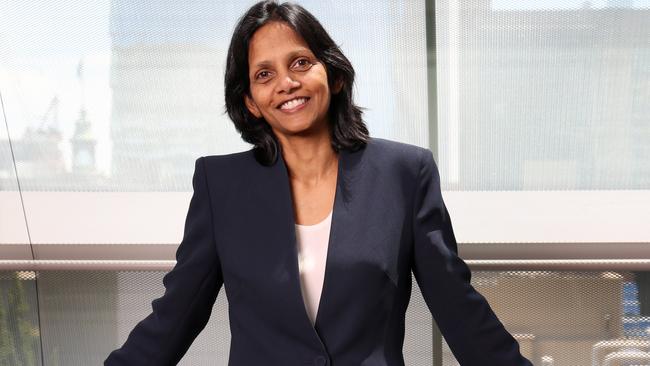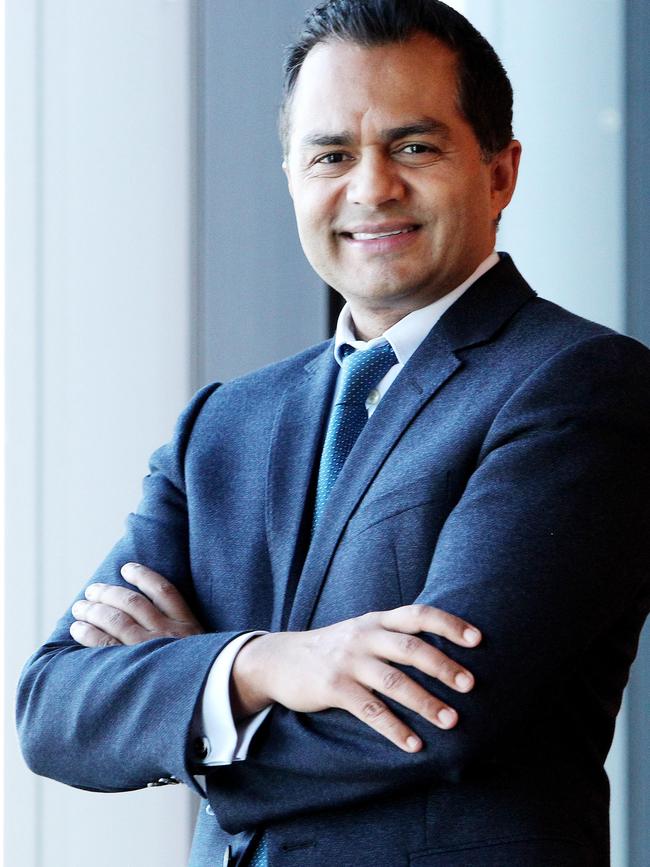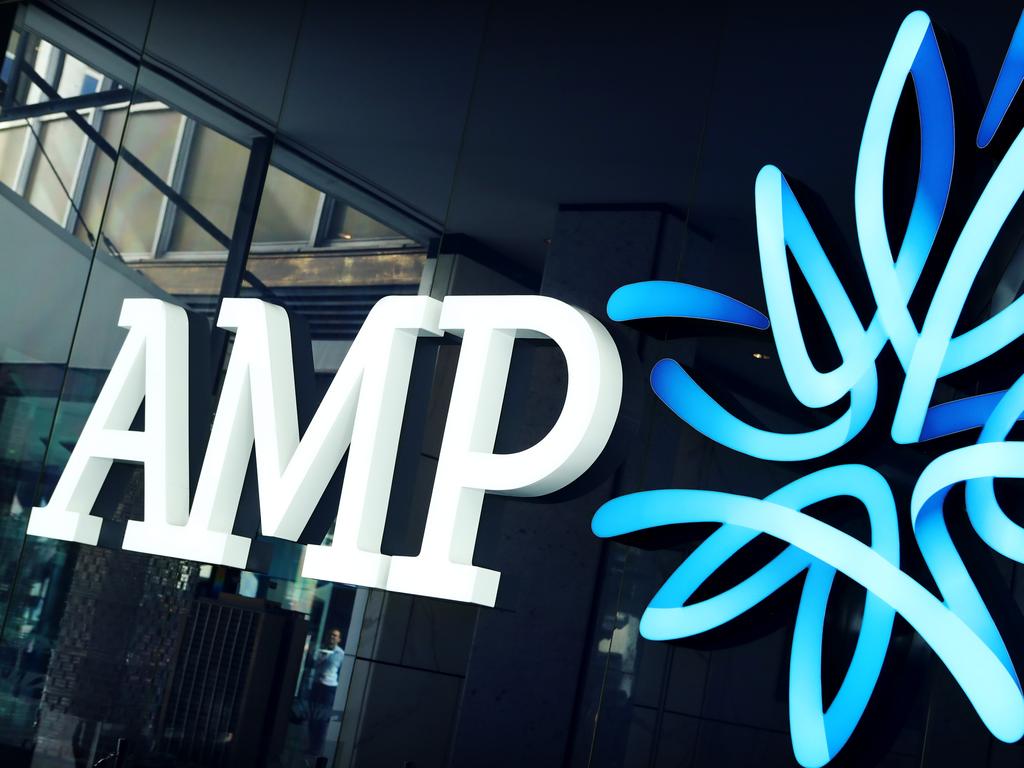
“Then think about where the open doors are for you,” she said in the Chief Executive Women annual address, on resilience.
Her own background includes living in three continents before she turned 13, living in financial hardship for five years in Britain and being forced to change school three times. That teaches resilience.
Wikramanayake stressed: “We need the richest possible combination of different ages, genders, cultural and racial backgrounds, diversity of sexual orientation and socio-economic backgrounds and experiences — and regardless of any disability.”
Which is not to say Macquarie is any beacon on the issue, given females account for just 35 per cent of applicants.
“My main message to girls is: why let boys have all the fun?” she said.
“I do not see myself as a female CEO with brown skin, who has to prove that brown-skinned female CEOs can deliver. I see myself as a CEO who is one of today’s custodians of a business built over 50 years by 75,000 people cumulatively delivering innovative solutions and strong outcomes,” she said.
On COVID, Wikramanayake said: “Crises give us the imperative to learn, adapt and emerge stronger. When we draw on reserves of resilience and work together to each bring our diverse skills and expertise to have impact beyond ourselves, then anything is possible.”
She said resilience was “first, our ability to quickly accept circumstances or obstacles beyond our control, identifying which are real obstacles and which are perceived obstacles of our own imagination or attitude; second, identifying where there is opportunity to respond ... finding those open doors even when you may be staring down an endless corridor of locked ones; and third, acting and changing what we can to drive positive outcomes, based on our own values”.
On the issue of race, she said her seven-year-old taught her “the best reason not to worry about your dark skin is that there’s nothing you can do about it”.
Still, she faced obstacles at work with clients looking twice when she arrived at the door.
One, she said, “after the deal concluded successfully, he took me aside and thanked me for teaching him about irrational prejudice and was then happy to have me lead further transactions for his company.
“If we do not create equal pathways for females to deliver their potential in the same way we do for males, we will not engage and gain value from half our population, which will lessen our output and growth,” she said.
Telstra punished
Telstra has agreed to pay a $50m fine for admitted unconscionable conduct by five licensed dealers in selling mobile phone plans to Indigenous people in the Northern Territory between January 2016 and August 2018.
Chief Andy Penn has made his mea culpas loud and clear and attempted to ensure it won’t happen, but the statement of facts said: “Telstra’s systems did not prevent the conduct from taking place and Telstra failed to act quickly enough to address the conduct, resulting in customers suffering detriment.
“As a result, the improper sales practices continued and caused severe financial hardship and great distress to many of the affected consumers.”
The snafu is a classic example of what goes wrong with big corporate bureaucracies. Following a grand meeting involving former chief David Thodey in 2013 to learn about the Indigenous community and how the company could help, sadly it presided over the exact opposite.
Thodey clearly didn’t take notes — the fine is the second biggest for consumer breaches behind the $125m fine against VW, but under the new penalty regime the fine could run to 10 per cent of the company’s $23bn in revenues.
Bega’s journey over
Bega’s Barry Irvin has bet the house to complete his journey to a complete dairy company with an ongoing role as consolidator.
The $534m deal includes $25.9m in mainly IT separation costs, which Bega says Lion will pay — but is a moot point.
As is the claimed earnings multiple of 10.9 times which excludes accounting changes that push the multiple to the 12 times mark.
Either way, for a company with a market value of $1.1bn it’s a big price. With debt of $518m or 3.3 times earnings it’s a leveraged company and there’s a massive $400m equity raising.
Lion has finally exited the dairy business at just 16 per cent of its entry price 12 years ago when it paid $3.6bn for National Foods and Dairy Farmers.
It will now concentrate on its beer assets in Australia and the US, including the country’s best beer, Furphy.
It comes after Treasurer Josh Frydenberg rejected FIRB advice and blocked the proposed Chinese government acquisition at $600m in August.
Bega now becomes the second-biggest milk processor at 1.7 billion litres, ahead of Fonterra at 1.5 billion litres and behind Saputo at 2.6 billion litres.
Bega was long on so-called “long shelf life” assets and now it is playing in the fresh food aisles with yoghurt, milk and fruit juice.
Lion Dairy came with the nation’s biggest cold food distribution chain, which is an ideal springboard into the convenience retail market.
It also becomes one of the single biggest suppliers to the big supermarkets.
Rival Saputo had the highest bid on the table but was knocked out on regulatory grounds, with the ACCC asking too many questions.
Bega picks up some strong brands including Dare iced coffee, Yoplait, Zooper Dooper ice drinks, Berri, Dairy Farmers, Pura and Farmers Union.
Having sold the Bega cheese brand rights to Fonterra some time ago this range of brands is Irvin’s dream portfolio.
It also gives him potential asset sales to help pay for the deal.
The company now controls 13 dairy processing and manufacturing plants, with some destined to be shut, such as the Chelsea facility outside Melbourne.
This is where Irvin becomes the consolidator in the industry.
Lendlease influential
Tarun Gupta’s appointment as Mark Steinert’s replacement as Stockland chief continues the extraordinary influence Lendlease has had on the property sector and corporate Australia.
Gupta was CFO at the company and while Lendlease chief Steve McCann is now into his 12th year as boss, wasn’t at the head of the internal line to replace him.
That position is probably held by Kylie Rampa, in competition with Asian boss Tony Lombardo and US boss Denis Hickey.

This list highlights the internal bench strength at the company.
The house that the late Dick Dusseldorp created has trained Mirvac chief Susan Lloyd-Hurwitz, former Suncorp boss Michael Cameron, his successor at GPT Bob Johnston, Scott Charlton at Transurban, Stockland chairman Tom Pocket, Charter Hall chair David Clarke, former AMP infrastructure executive and now corporate director Phil Garling, Resolution Capital’s Andrew Parsons and Charter Hall’s Carmel Hourigan, to name but a few.
One thing Lendlease did was give young people the chance to take leadership roles and if you had the right emotional intelligence and IQ, it backed you.
The challenge now for Gupta is to define exactly what sort of property company Stockland is. Mark Steinert was a great leader but left a complex company.







Macquarie boss Shemara Wikramanayake issued a firm challenge to women to “think about the real obstacles you have to accept in your life, across your business and in our community”.